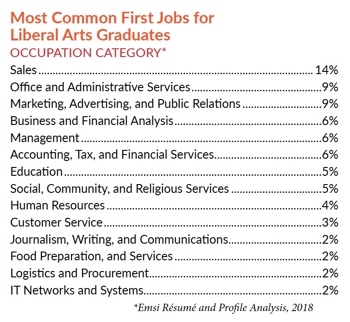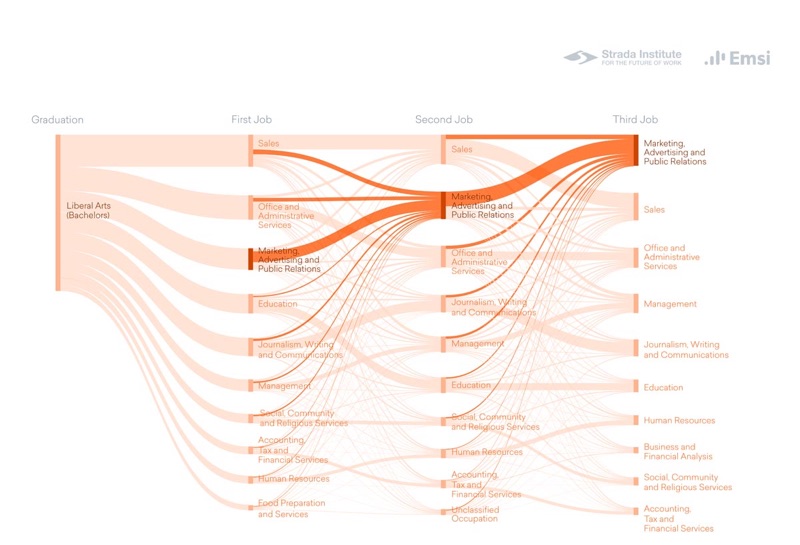Spring 2019
By Rob Sentz, EMSI
As Christians, we can agree that education is about a lot more than securing a good job. In his essay “Our English Syllabus,” C.S. Lewis writes that the purpose of education is to produce the good man, “the man of good taste and good feeling; the interesting and interested man.” Lewis is working with the same definition of education as the seminal Yale Report of 1828, which argued that the point of college education is to lay a foundation that is “broad, and deep, and solid.” Specifically, college should impart critical skills not included in mere job training, such as “the art of fixing the attention,” “analyzing a subject,” following “the course of argument,” and “balancing … evidence.”
Today, what Lewis and the Yale Report writers mean by “education” is what we call classical education, or the liberal arts. Here, “liberal” doesn’t mean not conservative (in the political sense). The word hails from the Latin “liberalis” meaning free, honorable, and generous—characteristics of a leader and a society builder. This vision for education stands in contrast to an increasingly dominant notion that college should primarily be judged based on its vocational merit which “aims at making not a good man, but a good banker, a good electrician, or a good surgeon,” says Lewis. Of course, we do need bankers, electricians, and surgeons, and of course they do need highly technical training, but as Lewis points out, our ideal should be to find time for both education and training, “for if education is beaten by training, civilization dies” (emphasis mine). So can you manage both education and training? Yes. As I’ll show you, a good education and a good career are not mutually exclusive.
WHAT YOU CAN DO WITH A
LIBERAL ARTS DEGREE — Liberal Arts Grads Hold Solid,
High-Paying Jobs
 I recently co-authored a report that evaluates the careers of liberal arts graduates. Analyzing tens of thousands of résumés and professional profiles, we discovered that liberal arts grads are employed in a wide variety of good jobs. Common first jobs include positions in sales, marketing, business, management, and finance. If you (or your parents, family, or teachers) worry that you can’t get a good job with a liberal arts degree, this data should put those fears to rest.
I recently co-authored a report that evaluates the careers of liberal arts graduates. Analyzing tens of thousands of résumés and professional profiles, we discovered that liberal arts grads are employed in a wide variety of good jobs. Common first jobs include positions in sales, marketing, business, management, and finance. If you (or your parents, family, or teachers) worry that you can’t get a good job with a liberal arts degree, this data should put those fears to rest.
Furthermore, liberal arts grads don’t get stuck. They tend to be lifelong learners who progress to better jobs over time. The above chart illustrates liberal arts grads’ second and third jobs. Notice the variety. In our chart we point out how many head to marketing over time. But also notice the incredible variation. Grads move from admin to sales, from writing to marketing, from education to management. Their broad foundation and ability to take on a wide variety of tasks has equipped them to naturally progress into new areas.

COMBINING HUMAN SKILLS
AND TECHNICAL SKILLS
The primary criticism of the liberal arts degree is that it doesn’t prepare you for a job. Now, a liberal arts degree is not career specific, but this lack of one-to-one correlation with a particular job is no obstacle if the liberal arts student supplements with a few technical skills. In our analysis, we observed the strategic value of combining human skills—like communication, analytical thinking, leadership, teamwork, creative problem-solving— with technical skills. Liberal arts grads are already qualified for numerous jobs without additional training, but those who do learn hard skills like coding, accounting, or software development frequently find open doors to even greater opportunities and are highly sought after by employers (even those in STEM careers).
Here’s a personal example. I work for Emsi, a labor market analytics firm that specializes in data, software, and consulting services for a wide array of clients across the U.S. and internationally. A large percentage of Emsi’s 180 employees are alumni from New Saint Andrews, a Christian liberal
arts college. Much like the data in the previous section indicates, these grads are employed in a wide variety of careers. They work as executives, writers, web developers, data analysts, software engineers, marketing managers, and event planners. They run our finance department, lead our engineering team, manage sales, head up product development.
In every case, their strong foundation and ability to solve problems (all work is really just problem-solving after all) has put them at a distinct advantage. From there, they add additional technical skills to complement their human skills—whether it’s through work experience, online classes, internships, and other opportunities.
America’s top jobs and in-demand skills are always changing. One thing, however, will remain the same. Good people—the sort C.S. Lewis talked about, the product of a Christian liberal arts education—will always be indispensable. Here you have a distinct advantage. You have a rock-solid foundation on which to add technical skills. But build that foundation first. The more you do, the more you will join an increasingly rare breed who can communicate, lead, be a team player, problem solve, innovate— and code a website.
LEAN IN AND WORK HARD
As you look back on your K–12 education, you should feel tremendous gratitude. Your education is building you into a kingdom fighter who studies, reasons, discerns, and takes the lead like Christ. Don’t toss that aside! Don’t assume that since you’ve studied Latin since second grade and you’ve “had” all that classical education, there isn’t much more to learn with liberal arts at a faithful Christian college. I’m not saying everyone must get a liberal arts degree from a Christian college. But, based on my experience and observations from the data, you will be giving yourself a two-fold advantage if you attend a faithful classical Christian college. Don’t be ashamed of that choice. Build on what you’ve been given and keep yourself in community with fellow believers and in touch with your true foundation and the Word.
God has used your education to bless and build you. At no point in your life should you feel like you need to escape this in order to succeed. Don’t lean away. Lean in. Embrace the gift. As you do, God will bless you. And one of those blessings will be good work. ![]()
ROB SENTZ is the chief innovation officer and marketing manager at Emsi, a labor market analytics firm in Moscow, Idaho. He recently published the report Robot Ready: Human Skills for the Future of Work, which explores the labor market outcomes of liberal arts graduates. Read more about his work at EconomicModeling.com/media. Rob and his wife, Bonnie, have five children, all of whom attend Logos School in Moscow, ID.
Read More: Good Employee












